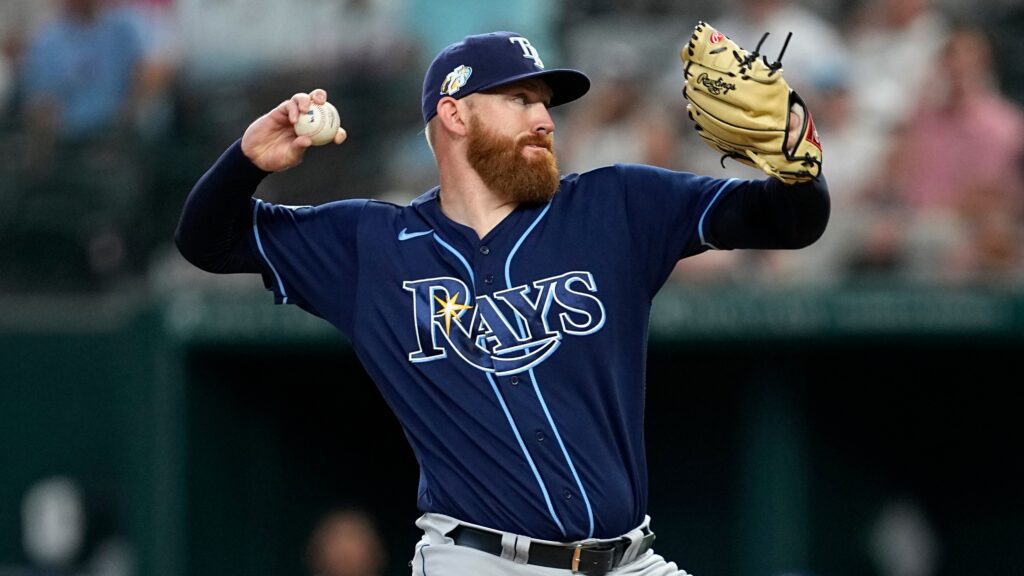ST. PETERSBURG, Fla. – The fall from grace for the Tampa Bay Rays has been swift and painful. Here’s a team that qualified for post-season play the past five years, and now, faces a winter of introspection and discontent.
The descent into the abyss can be attributed to a lack of consistency from the offense and a suspect pitching rotation. Especially hard hit was the continuity of the bullpen and defined starters for the rotation.
Sure, a core of starters now outlines the future. At the start of the season, those in the rotation were considered the strength of the team and a catalyst for success.
That did not last very long.
Three starters, Shane Baz, Jeffrey Springs and Shane McClanahan, all recovering from Tommy John surgery, their timetable remained ambiguous at best. The return of Taj Bradley from tightness in his pectoral muscle in spring training was clouded, and Zach Eflin, Aaron Civile, Ryan Pepiot, and Zack Littell were then considered the core.
By the time of the trade deadline in late July, Tampa Bay decision-makers realized “change” was inevitable and traded four pitchers. Civale was dispatched to Milwaukee, Eflin to Baltimore, and relievers Jason Adam to San Diego and Shawn Alexander to St Louis. Add the physical maladies to closer Peter Fairbanks (on the IR now for the second time this season) and the issue of reliability is merely exacerbated.
Among starters, the specter of inconsistency represented a significant factor for the Rays wallowing around .500 for the entire season. In Littell, the rotation held promise and in spring training, he told reporters, “I’m an innings-eater.”
Coming into this next start, scheduled against the Red Sox at home this coming Thursday, Littell leads the Rays staff in innings pitched with 144.2 innings in 27 starts. That averages to 5.36 innings per start and leaves open the possibility of going deeper in games.
With only two weeks remaining in the season, Littell’s record of 7-9 could represent that element of inconsistency. In his 27 starts through Sept. 15, he won back-to-back starts only twice. In a period from May 11 to July 22, a span of 12 starts, Littell managed only one win, and that was a 5-2 decision at Kansas City on July 2.
In late August, the grind of the season took effect. On Aug. 17, the Rays shut Littell down with right shoulder fatigue and he remained there until Sept. 1. With expansion of the rosters to 28 players. Littell returned to the mound on Sept. 2 and dropped a 5-4 decision to the Minnesota Twins at home.
After that game, he discounted the factor of missing several starts. At the same time, the cloud of inconsistency was ever-present.
“I wasn’t great and missed many over the plate,” he said after that effort against the Twins during the last home stand. “It was frustrating to go through those days and felt like I was shark through that. In the bullpen, playing catch, I felt good, Obviously, it’s not easy to simulate the game and the intensity. So, it’s really frustrating to go out there and not be as sharp as I would like.”
Littell’s effort should be viewed as a composite look at the staff. The issues of command, pitch selection, location, and the effort to maintain longevity are factors that dominate manager Kevin Cash’s thinking. That perspective was aired by Cash and his comments on Littlell’s initial effort off the Injured List.
“(Littlell) battled a little with his mechanics and command,” Cash told reporters. “Pretty uncharacteristic, I agree. He’s a strike-thrower (issued four walks in the Twins game, a season-high) and never managed to get in sync. I’m guessing he’ll bounce back, make the adjustments needed but he was down for, what 15, 20 days, and that seemed to have an effect.”
Since that last home start against Minnesota, Littell, who is signed through the 2024 season, responded and allowed one run in his next two starts. On the road at Baltimore and Cleveland, the 28-year-old turned in his best effort of the season on Sept. 13 against the Guardians. In six shut-out innings, he allowed only two hits, walked none, and recorded five strikeouts.
With likely two more starts, Littlel will have the winter to decipher the maladies with clouded a season once portrayed by hope. In a larger sense, this becomes the off-season task for Kyle Snyder, Cash’s trusted pitching coach. For the Rays to climb back among the American League elite, Synder and other decision-makers must drive his pitchers in two directions.
First, there is the necessity of a uniform effort and second, Cash, must give his pitchers a longer leach. Cash is known for going often and frequently to his bullpen and the prospect of Littell other starters, going deeper into games, becomes suspect and problematic.

